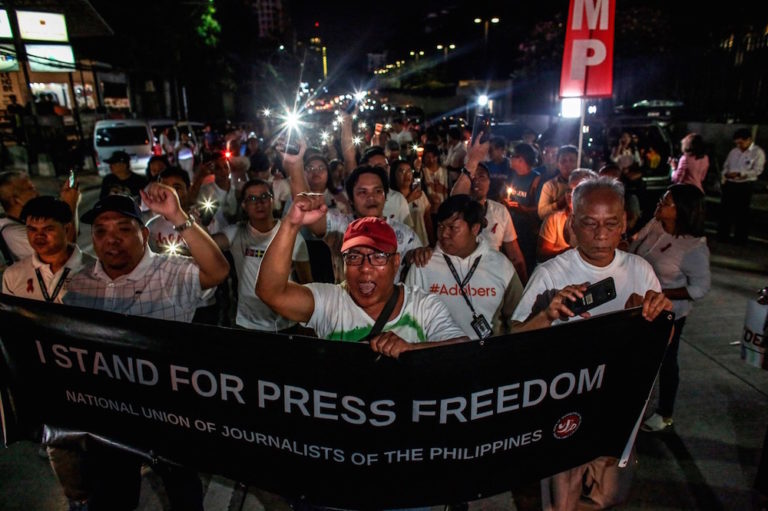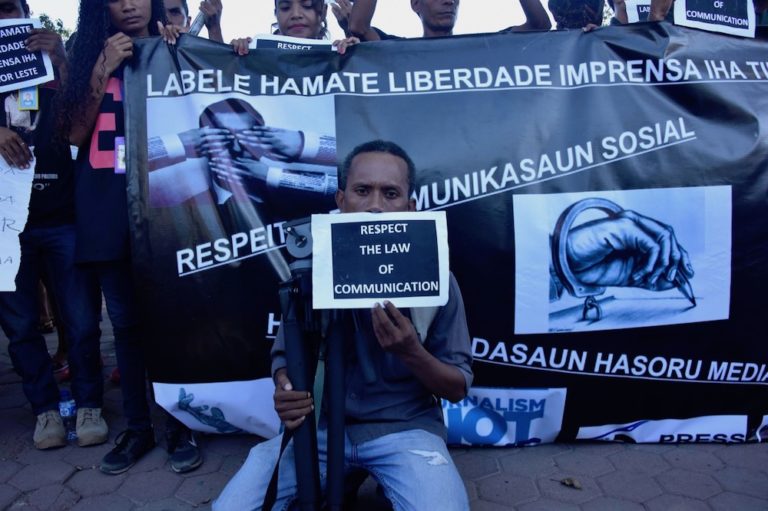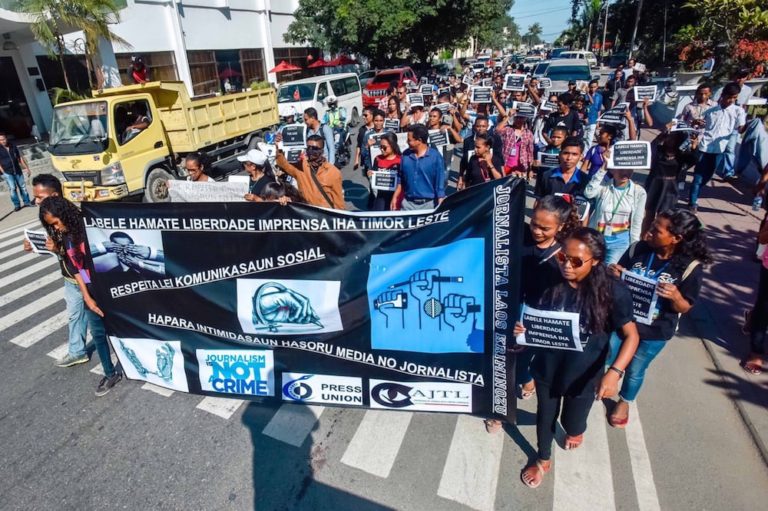(PINA/IFEX) – A senior Indonesian minister has shrugged off deep frustration within his own government over news media reporting of violence in East Timor, Australia’s “Sydney Morning Herald” reported on 29 May 1999 (local time). It quoted Indonesia’s Information Minister, Yunus Yosfiah, as saying Indonesia would not currently be facing a series of crises if […]
(PINA/IFEX) – A senior Indonesian minister has shrugged off deep frustration
within his own government over news media reporting of violence in East
Timor, Australia’s “Sydney Morning Herald” reported on 29 May 1999 (local
time). It quoted Indonesia’s Information Minister, Yunus Yosfiah, as saying
Indonesia would not currently be facing a series of crises if former
president Soeharto had allowed a free and open media. Yosfiah is also
reported as admitting for the first time that he led a 1975 Indonesian
attack in which five Australia-based journalists were killed in East Timor.
But he said that at the time he knew and heard nothing of the killing of the
journalists, allegedly carried out by Indonesian forces or forces under
Indonesian control.
**Updates IFEX alerts of 25 May, 18 May, 10 May, 21 April, 20 April and 29
March
1999**
Yosfiah told the “Sydney Morning Herald” that the policy of the now
discredited Soeharto, to impose severe restrictions on the media during his
32-year rule, made Soeharto unaware of the country’s mismanagement because
newspapers were too afraid to criticise. “Even if it was wrong, they made
reports to make their superiors happy,” he said during an interview with the
newspaper in Jakarta, the Indonesian capital. “That put the country in the
crisis it faces now.”
The “Sydney Morning Herald” said that since taking over the Information
Ministry in May last year, Yosfiah has overseen the dramatic unshackling of
the Indonesian media and has opened the country to unrestricted foreign
reporting. Black-bans on journalists have been scrapped and Yosfiah has
given assurances they will not be re-introduced despite criticisms within
President B.J. Habibie’s government of reporting from East Timor about
Indonesian police and soldiers supporting pro-Jakarta militia groups that
have killed up to 100 Timorese since January. Yosfiah said that for the
first 53 years of Indonesia’s independence, the government in Jakarta issued
only 289 media licences. But since the restrictions were lifted, 718 more
licences had been granted. “Now we are really creating an atmosphere of
press freedom,” he told the newspaper.
During the campaign leading up to Indonesia’s first free elections in
decades, newspapers and magazines have focused on accusations that the
Soeharto family illegally amassed a fortune and that President Habibie’s
administration had failed to order a proper investigation. Publications
which, before Soeharto lost power, avoided even slight criticisms of the
Soeharto administration are now referring to him as the “disgraced” former
president and a “despot”, the “Sydney Morning Herald” said. Yosfiah said
that when he took over the Department of Information it also worked as a
department of censorship.”There is no more censorship,” he told the
newspaper.
Yosfiah denied to the “Sydney Morning Herald” that Indonesian security
forces in East Timor were allowing pro-Jakarta militia groups to create fear
and intimidation in the lead up to an August referendum on possible
independence for the former Portuguese colony. Indonesia has ruled East
Timor since invading it in 1975. He said he believed that only a small group
of “individuals” were responsible for the violence that has raised serious
doubts about whether the ballot can go ahead.
The “Sydney Morning Herald” reported that Yosfiah admitted that he led the
1975 attack on an East Timor border town called Balibo. But he said that he
saw none of the Australia-based journalists who died. He added that he
stayed in the area for “maybe 10 days or two weeks” after the operation, the
newspaper reported. But he has rejected key aspects of a finding by the
former chairman of Australia’s National Crime Authority, Tom Sherman, who
said he was the man “most likely” to have led the soldiers who killed the
newsmen, dressed them in military uniforms for propaganda purposes, then
burnt their bodies.
Former Lieutenant-General Yosfiah told the “Sydney Morning Herald” he had
never seen the TV newsmen “alive or dead”. Nor, he said, had he received any
reports that foreigners had been killed in Balibo. “I have never seen the
bodies,” he was quoted as saying. “I’ve never seen [the journalists] alive
or dead. Not even one. I haven’t even [had a report about that from] my
subordinates.”
As the “Sydney Morning Herald” reported, Yosfiah was asked: “So you led the
attack and you stayed in Balibo for 10 days. Five foreigners were killed but
you didn’t see them alive or dead? And nobody reported it?” He answered:
“Right!”
In an interview carried out several years ago, the officer in charge of
those operations, Lieutenant-General Dading Kalbuadi, revealed that Yosfiah
had led the attack on Balibo. But in 1998 interviews, Yosfiah denied that he
had been in Balibo during the attack.
Yosfiah rejected an October 1998 claim by Orlandino Maia Guterres, an East
Timorese who claims to have been attached to the Indonesian force, that the
attackers knew in advance that there were foreign journalists in Balibo. “I
never had any brief about that,” Yosfiah told the “Sydney Morning Herald”.
Sherman accepted that while some Indonesian officers higher up the chain of
command “knew of the possible presence of journalists in Balibo prior to the
attack”, there was no evidence that the attacking troops had been told about
the journalists, the newspaper reported.
When asked about reports that the bodies of some newsmen had been dressed in
East Timorese pro-independence Fretilin force uniforms and photographed
behind a machine-gun for propaganda purposes, Yosfiah told the “Sydney
Morning Herald”: “Are there any photographs? “You know, I have heard
several stories about that. I have a brother-in-law in Australia and some
family there. One of them mentioned that. The other story [is] that I asked
the journalists to stand against the wall and I shot them. That is another
story. Which story will you follow?”
Yosfiah, whose wife is East Timorese, said that at present foreign
journalists in East Timor were sometimes failing to report that there was “a
big group of people” who favoured integration with Indonesia. “That’s why
the … pro-integration [side] sometimes perceive that the international
journalists are very unbalanced,” he told the “Sydney Morning Herald”. “That
is why they make a reaction, because for a long time they have been treated
not fair by the international journalists.”
Background Information
East Timorese are scheduled to vote on 8 August in a referendum on possible
independence from Indonesian rule of the former Portuguese colony of 800,000
people. A total of six international media workers were killed during
Indonesia’s 1975 invasion. Organisations such as the International
Federation of Journalists (IFJ) and Australian colleagues have called for
investigations into continuing allegations they were deliberately killed by
Indonesian forces or forces under Indonesian control (see IFEX alerts).
Indonesian and Australian journalists’ organisations plan to open a media
safety office in East Timor, Australian Associated Press (AAP) reported on
25 May 1999. It comes amidst continuing threats to journalists trying to
cover growing violence in the lead up to the August referendum.
On 24 May, the “Sydney Morning Herald” reported that the Australian embassy
in Jakarta had sought reassurances from Indonesian authorities over threats
made against the paper’s correspondent and photographer in Dili. The
Australian ambassador, John McCarthy, said he had asked embassy officials to
seek an assurance about the safety of correspondent Mark Dodd and
photojournalist Jason South after a group opposing East Timor independence
issued a statement accusing them of bias and declaring “blackmailers should
be stopped”.
International journalists have reported they are being forcibly stopped from
going to areas in East Timor where there are reports of killings by
pro-Indonesian forces. On 18 May, AAP correspondent John Martinkus said
attempts by journalists and relief workers to reach the areas were stopped
at gunpoint by pro-Indonesian militia forces. Earlier, international
journalists attempting to cover a renewed rampage by pro-Indonesia
militiamen in the East Timorese capital, Dili, were attacked and threatened,
the “Sydney Morning Herald” reported on 10 May.


